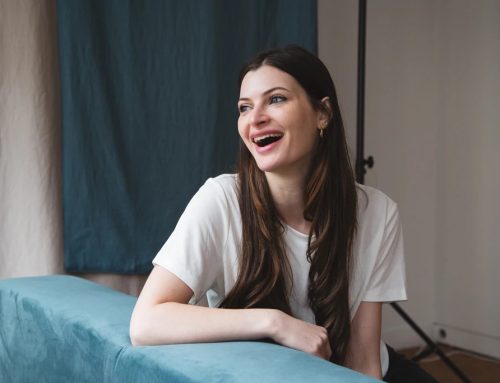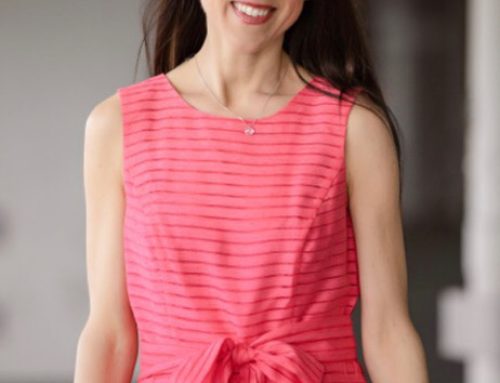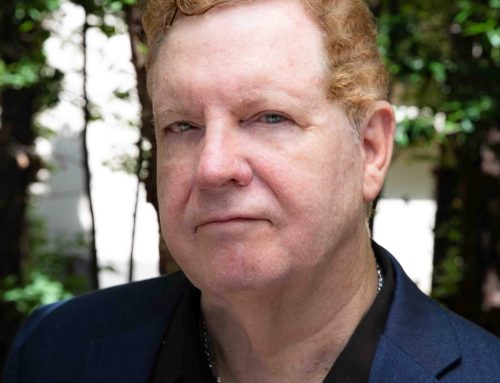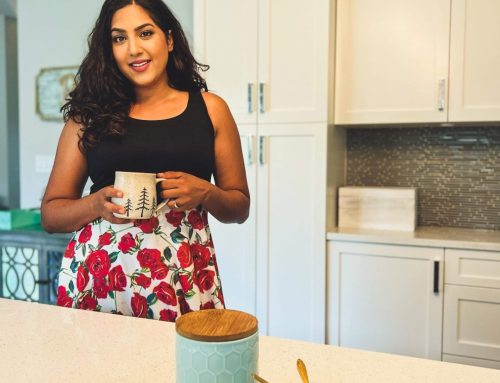This episode of the Filled Up Cup was actually recorded last fall. I had a bunch of glitches with technology, and so Alison was my first real recording with a stranger. So if I sound super nervous, it was because I was, I am such a big fan of Alison’s and decided since her book stay woke, not broke is released this month. It’s the perfect time to share this episode with you. I hope you enjoy.
Ashley: I am so excited that we have Alison Tedford on the Filled Up Cup podcast today for anybody who doesn’t know, Alison is so many things: She is an author, a freelance writer, marketer, content creator, mom, diversity and inclusivity coach. I don’t think that we’ve ever had the pleasure of meeting in real life, but we live super close to each other and you’re actually a total lifesaver, you’ve hooked us up with a great cleaner and a tutor for my daughter. So thank you for that. For anybody who is unfamiliar with you, could you tell them a little bit about yourself?
Alison: For sure. Yeah, I’m a single mom. I live in Abbotsford. I write for publications and charities, nonprofits, magazines. I write books and I work with small business owners on how to make their businesses more inclusive. So that’s my work life. I’m a mom with a disability, so I spend a lot of time managing health and wellness and a lot of energy advocating on issues of wellness from a disability perspective and also from an indigenous health perspective, as I’m a first nations woman.
EHLERS-DANLOS SYNDROME
Ashley: Your first book that you published came out last, was it April?
Alison: Yeah.
Ashley: That was Chronic Profit. Could you tell everybody about your book a little bit?
Alison: Chronic profit was about chronic pain and entrepreneurship. Basically how to run a business when you’re dealing with persistent pain based on my own personal experiences, but I also included interviews with like 20 other entrepreneurs who either struggle with chronic pain themselves or they support chronic pain patients as their clients. So it was really kind of a broad range of perspectives.
Ashley: It definitely was. I actually, I bought the book myself and it was really important to understand that so many people have chronic pain. The number of is, but like one in five, which I think sometimes people wouldn’t necessarily realize or. If you are not somebody who has a disability or people with disabilities in your life, that ableism would kind of step in and think, oh, not that many people suffer
Alison: Yeah, it’s definitely not something that that there’s enough awareness about. And it is pretty prevalent. Especially within the entrepreneurial space, especially with many entrepreneurs being older or many people going into entrepreneurship because they struggle with traditional employment due to issues around health and wellness.
Ashley: Which I think is really important about your book and especially coming from a smaller city where a lot of times you think, okay, well, if I live in a small city, I can’t do X, Y, Z. So to see that you’ve taken your condition really pivoted with it. You have a connective tissue disorder. Is that something that you were born with or something that you’ve had your entire life?
Alison: I was born with it, but I didn’t realize that I had it until probably five years ago, four or five years ago. It wasn’t diagnosed until late in life. A lot of the impacts like the manifestations were diagnosed kind of separately but there wasn’t a strong sense of what was causing all of the problems so we did finally get to the bottom of it.
Ashley: That, that must’ve been super frustrating.
Alison: It has, especially because, you know, I find that you don’t always get taken seriously especially if you have multiple conditions, people tend to think that like, well, you must be a hypochondriac. If all of these things are wrong with you. And it’s like, maybe there’s something that’s causing all of these things.
Ashley: There’s such a gaslighting with the medical industry as well. And especially, I would imagine being a woman and especially an indigenous woman, that there is probably a lot of prejudice involved.
Alison: Well, and I think the other piece is that, I mean, doctors are trained, you know, the reason why people with Ehlers-Danlos are called zebras is when you think, when you hear hoof beats, you think horses not zebras. So doctors are trained to think about horses and they don’t necessarily think about zebras. So it takes a while. And there’s lots of doctors who aren’t even terribly educated about the condition and they don’t necessarily know about it, or they don’t know very much about it, or they spend a very short period of time on it in their education. So they might not necessarily know what to look for or remember. So it can take a specialist to diagnose. When it’s something affects your whole system, it’s hard to know what kind of specialist do you need? You don’t know what you’re dealing with.
Ashley: Is it something that is very common or is it a rare?
Alison: It’s technically a rare disorder. I’m not sure to what extent it’s actually rare or rarely diagnosed because of all of the reasons that I mentioned, but yeah, it is technically considered a rare disorder. But I think it’s a lot more prevalent because people just don’t realize, especially when you normalize things like when you’ve grown up and you’ve always had kind of weird feelings in your joints, or you’ve always had certain things that you’ve accommodated, not even thinking that, that wasn’t maybe normal people don’t have that. I had no idea. I was like, what do you mean? There’s people who wake up every day and feel wonderful and don’t want to vomit. What is that about?
INCLUSIVITY MEANS MORE THAN HAVING ELEVATORS
Ashley: Do you find that when you try to go to places now, do you find that it’s harder to find places that are more inclusive to disabilities or have you found that has sort of shifted? And I know right now it would be kind of hard because the world is sort of in the state that we are in (with the pandemic).
Alison: I’ve actually found like, through the pandemic, things are a little bit more inclusive because I’m able to do a lot of things virtually where I don’t have to worry about whether the physical space can accommodate me. So that’s been one of the benefits . I don’t travel terribly well. It’s been nice to be able to do some speaking places where it would normally be a little bit tougher for me to get to. But yeah, I mean, I think that there’s more of a movement towards inclusion and that there are more organizations who are open to talking about things, but there’s still like a long ways to go. I know a few years ago I was at a sporting event and had issues and I explained that I couldn’t go into a space because it wasn’t accessible for me. And they were like, what, what are you talking about? It has an elevator. Well, that’s not the answer. Not everything is about stairs.
Ashley: No, not at all.
Alison: Good. It’s a good starting point and it’s important, but it’s definitely not the only thing. And so I think over time, I think that’s something that’s going to get a little bit easier with more education, but definitely we have some, some ways to go in some respects.
Ashley: For sure. What’s one thing that you would hope that businesses would think about inclusivity for all people, even thinking about like a lot of what I talk about as a lot of like self care and industries that you would think potentially are a traditional self care, like say nail salons or spas or things like that. You know, as somebody who has never really had to think about it, it would never occur to me. You know, when going to a place like that, the challenges that other people may face
Alison: I mean, I think it’s important to recognize like the variability, like if you have a client who has a disability, that their ability to do things or tolerate things might be different from session to session. That just because something was okay, last time doesn’t mean that it’s gonna work this time. I know for me, like if I am going to get my nails done and I’ve had a dislocation, like I may not be as comfortable with like a massage. It might need to be a lot lighter. I may or may not have trouble getting up on a table for a massage. So yeah, or even just the fragility of my skin can be a challenge so if I’m having issues with that, then it’s just good that folks just take an extra couple of seconds to think everything through and look at what’s going on and see what needs to be accommodated and really checking in with your people and listening instead of just like how’s it going today? Like waiting for the answer and it’s not a social thing. It’s like a, medical information exchange.
Ashley: I’m sure that it must get super frustrating having to kind of go over it with service practitioners or whereas places like that all the time that it must just be exhausting having to explain.
Alison: Yeah, it can be, but I found that there’s been more awareness lately as a number of higher profile celebrities have come forward with EDS. Some people have, like that’s what I have Ehlers-Danlos syndrome, that people will know a bit more about it. Like I, when I went to the optometrist, and it was an intern who was doing ours, are my son and my assessments and she, her favorite YouTuber had EDS. So she knew all of these patients. And so I was so glad when she actually got hired on full-time at our optometrists office cause she takes care of us and she knows because she has a personal interest. So yeah, as, as awareness is growing, it’s getting a little easier, but definitely there’s a lot of things to explain. It can be tiring but it’s good too when you have like an ongoing system relationship with service providers and especially like really experienced ones. My massage therapist was the athletic therapist for the BC Lions. He, I think he recognized some of my hyper-mobility issues before. I really understood what they were. And so he’s really good at being able to take care of me properly and. Yeah, just being able to find people that are really good at what they do. And, and who are consistently going to be the people who are going to be supporting you is really important.
Ashley: Well, I think it really, once you find your people, it really does make a huge difference. I know whether its things like finding the right optometrist or even sometimes just finding like the right hairdresser. And I find, especially living in a smaller city, it’s not always the easiest to have access. Like I know Abbotsford isn’t as small as a lot of other places, but we still don’t have a ton of stuff here.
Alison: Yeah, it can definitely be a challenge. I’ve been with my hairdresser for a number of years and he’s really good. And I mean, one of the areas I’ve really struggled was finding like dental care with somebody that is educated about the impacts because it can cause issues with teeth and gums. There can just be a lot of stigma around having those challenges so having a dentist who understands is really important.
SELF-CARE PRACTICES
Ashley: Yeah, absolutely. Thinking about self care and stuff like this, I know you do something that’s fantastic and you send yourself flowers every week. What are some other self-care things that you find that are really beneficial for your life?
Alison: I have a giant soaker tub in my apartment, my new apartment, which I love so I spend a lot of time there and I order bath bombs and things from one of my girlfriends who makes them. And I bring in help with the house. My cleaner Chelsea comes and takes care of us and make sure that everything is organized and she does all the things that I can’t do or that are like just maybe I could, but we’ll leave me with too few spoons if I try to do them all myself. So that, that has been a really big help. And then also like we use meal kits and fully prepped salads and things like that, so that I’m not having to spend as much time on meal planning on grocery list development on grocery shopping, like all of those things. So being able to free up my time so that I can focus on the things that I want to do or that I need to do.
BE MORE LIKE CHAD
Ashley: How do you find balance with it all?
Alison: I find that it hasn’t been very well balanced. I’ve been working way too much. I super over-function over the pandemic. Cause I was just like, this is really emotionally uncomfortable. I’m going to keep powering. If I stop, I’ll have to think about all of the things that are happening and how crappy it is. I think keep working. So I really, really pushed through October is supposed to be quiet every time I say a certain month, it’s going to be quiet all heck breaks loose, but I’m feeling like October is going to keep itself under control. So I’m working more towards that, but I had to make some changes in my business to make that possible. I had to reduce the number of services I was providing. I had to reassess my rates for services that I was keeping on and really looking at and having standard ways of doing things and and taking care about like how much I’m going to take on, because I’m starting to get better about turning things down and just being like, this is not possible. There’s only one me.
Ashley: I would imagine the fact that you’ve been able to do so much. Whether it’s freelance writing, whether it’s writing your own book getting into coaching or teaching that writing workshop, things like that, that you’ve probably been able to find out what you love and maybe what you don’t love so much.
Alison: Yeah, it’s definitely a lot easier. In the beginning I did a lot of virtual assisting, transcribing, direct social media management, and those are services that I don’t offer anymore so I could focus on writing, coaching and teaching and speaking and that is a better balance for me. And it, it allows me to work fewer hours because I was just, I was working way too many hours and charging too little and kind of making it up on volume but my body eventually was just like, no, we cannot do this.
Ashley: Do you think that the rates were like how women, we tend to sort of imposter syndrome or undervalue ourselves? Do you think that setting the rates were kind of fitting into that?
Alison: I think there was a lot of things that went into it. I think we had socialized to make people more comfortable. And if like our rate is making people uncomfortable, well then maybe I can offer a discount or maybe I don’t really need that much. Or, you know, and then also we get used to, you know, because of diet culture messaging, we get used to living on as little as possible, and that can translate into our rates and what we charge for our services. So it’s like, well, do you really need that much? So there was that. And then also, I mean, I could have made a lateral move in from where I was at, in my traditional employment with, into my business, but I really felt like I needed to like work my way up. So I’ve started doing like assistant level work when I had left my last job as a project officer. So I had been a subject matter expert and I kind of bumped myself into clerical work because I felt like I needed that experience under my belt before I could move forward. I mean, it was definitely valuable and important. And I love the work that I did for people. And it was, it was key for my business, but if I had done things differently and done a more lateral move into the private sector it might not have taken my business as long to become profitable, or I might have done less damage to my body in the process of trying to make it profitable.
Ashley: The things that we realize in hindsight.
Alison: Yes for sure. Now, I mean, I’m grateful for everybody who put their trust in me in the beginning and let me show that I could do what I could do and I wish I had had more confidence in the beginning to be able to move into those next phases of evolution more quickly. Instead of second, guessing myself all the time,
Ashley: I think in a lot of ways, society teaches us to second guess ourselves and doesn’t really allow women to be, you know, Frontline and center and taking charge in a way we kind of feel like we have to be like, okay, well, we’re here. We’re just going to do this little thing over here and then slowly take up more space before it’s like, yeah, I’m here. Like what are you going to do about it basically?
Alison: I definitely noticed that, you know a lot of men within my industry are a lot more comfortable talking about you know, their revenue and, and all of these things where. It’s kind of taboo. I mean it’s a little less so, and in some ways it’s moved a little bit to the other side where it’s a bit much sometimes, but definitely I found in the beginning, like I wasn’t comfortable sharing that my business was doing well. I’ve had to be a schedule planner ask myself, like, would Chad worry about telling people this? Like, no, he would be like super stoked to be like, yeah, I’m a six figure business owner. Right? Like, so starting to get more comfortable in and and being willing to be seen for what I’m actually doing and where I’m actually at.
Ashley: The more that you do kind of share about it I do think it, it does give a lot of people hope whether they have disabilities, whether it’s just like a woman, small business owner or somebody local that maybe does have that misconception, that if they’re from like a smaller town, that they’re not able to do these things. I also really think that people around us do tend to love to tear people down so I can understand why when you are saying, Hey, I got all these crazy things where it would feel scary because then there’s always somebody that wants to say something or try to rip each other down. That it’s sort of sad that I feel like it’s women to women that tend to do this more than. You know, Chad to women.
Alison: I think there’s definitely different dynamics at play. I think that oftentimes the way, even the way we described the work that we do can vary so much in a gender-based way. Like so often people will be looking for a virtual assistant who can write emails where like they would hire like a male copywriter, right? Like same thing. Right. But it gets, it gets gendered and it gets devalued by being categorized as clerical work where it’s actually creative marketing work. And not that clerical work doesn’t have value, but just that clerical work isn’t often rewarded on the same level.
Ashley: No, not at all.
Alison: And because of that, because of those kinds of gendered expectations around how we talk about what we do, that can mean that somebody’s doing the same work as somebody else is making less. Just because we’re more comfortable thinking about, you know, virtual assistants who write emails versus calling a woman a copywriter. So I think that can be a challenge just in the way things get structured and with coaching and more awareness, like I think it’s more often people who are newer to industries and don’t realize the value of their work yet. That’s something that can be addressed and you can definitely move forward from that, but I always try to suggest that people who are new to the industry to really look at the value of the work that they’re doing and not sell themselves short or discount things, because they think they’re not doing things in the exact same way. Other people are like, I’ve seen VA’s who were like, well I can’t charge as much because I’m only available evenings and weekends. I’m like, are you kidding me? You’re offering a premium service where you’re available evenings and weekends when other people are not exactly easy to discount situation, this is a premium. There’s a lot of room for movement and a lot of room for growth and understanding of what, what we all do and how we all contribute within the space. I think being aware of the gender expectations around what we do and how we talk about it as important. But I think that there’s a lot of room like I know so many powerful women who are just killing it in the online business industry and it’s definitely possible. I think we often limit ourselves in terms of what we think we can do. I remember somebody told me that I’d never make more than $60,000 a year as a writer. It stuck with me for a long time until someone was like, what are you talking about? Of course you can. It was like, oh.
Ashley: Well, cause I think we are, we’re definitely used to putting ourselves into small boxes
Alison: Yeah. And I think it’s when you don’t know what else is available, it’s hard to hope for it, right? When you don’t know what’s, what’s an option, right.
Ashley: Maybe internet really did change that. Like, it really is this like open sea of billions of dollars that people just have to kind of carve out a place for themselves and find what that means for them
Alison: Yeah, for sure. I’ve been able to work with clients in the UK, Germany and the US.
Ashley: The internet really makes the world such a small place. Like 10 years ago could you imagine saying, oh yeah, I’m going to be working with people in Germany and the UK?
BEING A MOM BLOGGER MINUS THE EYE ROLL
Alison: I would’ve been like, no, that doesn’t sound possible, but a cute idea, but yeah, it’s wild to think that I don’t even have all that many local clients, mostly they are international because I was able to position myself in those spaces when I wrote for publications in the US and was able to make connections with writers and other people who would refer me. So yeah, it was a really fortunate, most of my connections initially came through blogging which often gets kind of condescended like, oh, you have a mommy blog. That’s so cute. And it’s like, yes. And it grew into this big thing that’s awesome.
Ashley: No, it drives me so crazy because any show that you watch here, the most narcissistic, like annoying characters and it’s like, we’re not like that. We’re not all mean, we’re not all catty that it’s just like awful. But what movie was that it was that one was Blake Lively and Anna Something, it was basically like Blake Lively does this **spoiler alert** murderer. And Anna started like a murder in baking podcast and solved the whole thing, but she was just the most annoying character we can be multi-faceted things and still have a good Instagram feed.
Alison: Yeah exactly mine’s just not going to feature a lot of food.
Ashley: Yeah. Or bikini is, or whatever the case may be. But I don’t know about you. I kind of aged out of the mommy blog thing that even though I totally loved it, and I don’t know whether your son came with you. So like a lot of these events or did the things, but I know we reached the point with my daughter where it was like smile like you like me. Yeah, which I think is so hard because they all, at a certain point, they just don’t want to do those things. Not that they don’t like us.
Alison: I mean, for me, I just got very busy and I didn’t have as much time to devote to it. So it just laddered differently. Like I was targeted by different kinds of brands work with like Shopper’s Drug Mart for their run for women to raise money for mental health and things like that. I was writing for a lot of different kind of us parenting publications so I wasn’t as aligned with like, doing reviews about granola bars or things. It was more kind of topical to social issues. So, yeah, so my business was always a little bit different to begin with. My son is involved now. Like he takes photos for me for Instagram and he charges me because he knows that freelances don’t work for free.
Ashley: Exactly. But that’s such a great tool to teach them.
Alison: Exactly. Yeah. So he really loves that. And so he’s involved in the ways that he wants to be starting to teach them how to use Canva, to create graphics and things so it’s kind of as much of a family business as he wants it to be. But I really just want him to follow his own interests and not feel obligated. I mean, he had so many cool experiences through mommy blogging. Like he was a Canuck for a day. He went to Minecraft camp, like he did so many cool things and he really is grateful but now he’s at a point where he doesn’t love being photographed all that much. The tween, you know, he wants me to like pay him extra to be in pictures.
RAISING TEENAGERS
Ashley: I know I was scrolling through my phone the other day to try to international daughter’s day to try to think of something to post for that. And then I was like in the last year, because we haven’t had events and really have just stayed at home that it’s like, we don’t have selfies together the same way that we would have. I think our kids are same age, mine turned 14 in the Spring.
Alison: Mine’s 14 in November.
Ashley: Yeah. So they’re definitely in that teenage I know mine is anyways, from the teenage phase where the next four years are going to be interesting.
Alison: Yes, definitely. But exciting.
Ashley: Yes. Well, I think that’s also the difference between being a boy, mom and a girl, mom. I feel like yours is going to like you a lot more in the next four years, mine’s already like you three weeks out of the month. My head spins for that final week, I literally gave birth to like a miniature version of myself for better or worse.
Alison: Mine is very much like me also, but I’m very fortunate. He’s very, very affectionate. He tells me, you know, mommy, I love you so much, mommy. You’re so amazing like 20 times a day. So it’s very cute. Eventually maybe he will not say that but for now he is yeah, he’s very cuddly and loving and even like on his dad’s parenting time, he comes over after school and hangs out with me till his dad gets off work.
Ashley: Well, that’s good.
Alison: Yes, we got a little extra time and I, you know, maybe it’s related to snacks and like willing to order, skip the dishes, make sure.
Ashley: Take whatever you can get.
Alison: Maybe he’s incentivized, but I’m rolling with it.
Ashley: Definitely do, because I think it’s also one of those things I don’t know about you, but the teen years Or something that’s definitely challenging as we sort of start in this journey. So I think the more that we can kind of keep them being open with us and the mommy’s. I love you. And all of that kind of thing. I think it will be our saving grace.
Alison: Yes, I think so too.
STAY WOKE, NOT BROKE
Ashley: You have another book coming out. When does your next one drop?
Alison: My next one comes up next April, it’s called Stay Woke, Not Broke. And it’s about how to integrate social justice into your business. And yeah, so that’s more written from my perspective and based on some of the curriculum that I developed last year when I found a lot of business owners for looking at not knowing how to talk about social issues within their business and not knowing how to moderate inclusive communities and not really knowing how to. Talk about what mattered to them without looking like a bandwagon jumper,
Ashley: Which is something that I think a lot of businesses definitely suffered with. I know being a white woman, it’s like, you don’t want to say the wrong thing and you want to be an ally and you want to be a part of the cause without making the cause all about yourself.
Alison: Yes. So I have a couple of profiles of businesses that I included, but it isn’t nearly as many, I think I got two this time compared to like over 20 last time. And yeah, so that’s coming out and I also, this year wrote a textbook with a client called to create, to learn. And that covers Some traditional crafting activities and some digital practices like podcasting, graphic design, things like that. All from the perspective of indigenous creatives.
Ashley: Oh, that’s amazing. Where can people find the textbook?
Alison: the textbook is available on Amazon. So you can order it there and then stay woke not broke is available. You can, pre-order it pretty much anywhere that books are sold. So yeah, Barnes and noble chapters Amazon all sorts of places pretty much anywhere you can. Pre-order a book.
Ashley: Have you tried to visit your books actually in person or like, try to know when you always see like the people signing their books and then leaving them on the shelves?
Alison: I haven’t done that yet actually. My books can be ordered in, there’s only a couple stores where the books are already like living generally. I believe it’s Coho books in Campbell River and Massey books in Vancouver and Iron Dog has ordered them, in Vancouver. So mostly they’re being sold online and then the audio book is coming out next month so it should be exciting. October 2021 is when it’s supposed to be coming out and then Stay Woke comes out in April 2022.
Ashley: That is so amazing
Alison: Yeah. It’s a lot of fun. I’m very grateful for the opportunity. And I mean, that was another writing connection. Like another writer I knew referred me to her publisher, so I didn’t have to go through like shopping things around all sorts of places and developing a book proposal or anything. I was able to have a conversation with an actual human, but what I want to do it turns it into a book, so it was pretty cool.
Ashley: I think that both of those topics are going to be so beneficial and help so many people, whether it’s Chronic Profit and people are realizing that just because you are in pain or just because you have a disability doesn’t mean that you don’t have opportunities to make money or to create this life that you want. And I think anytime that anybody has the opportunity to learn about diversity and to you know, not stick their foot in their mouth and really be more aware and accepting of others is fantastic. So to put those things out in the world for other people is really, really great.
Alison: Thanks. I’m really excited.
Ashley: Where can everybody find you online if they’re looking for you?
Alison: My website is alisontedford.com and my Instagram is at @AlisonTedford and so is my Facebook. And my Twitter is at @Alliespins or you can look me up Alison Tedford on LinkedIn.







Leave A Comment